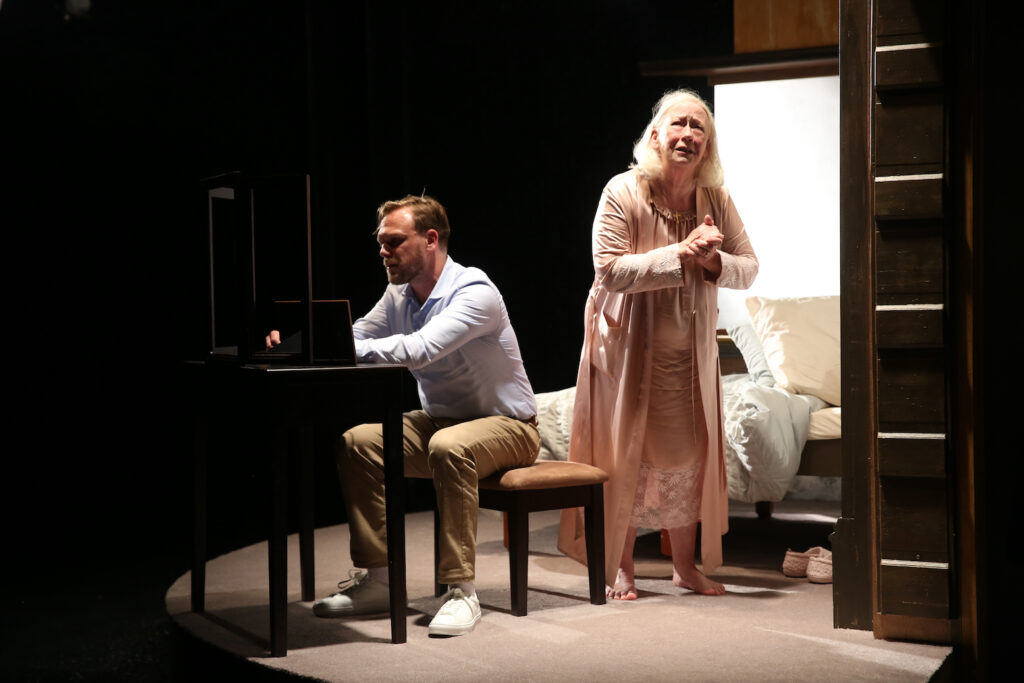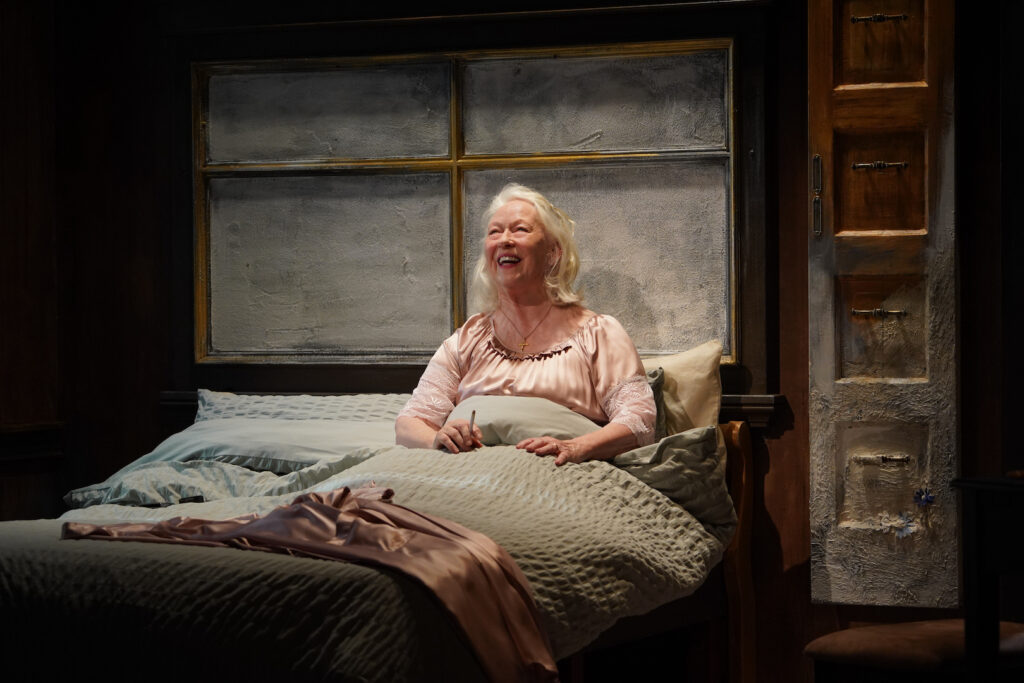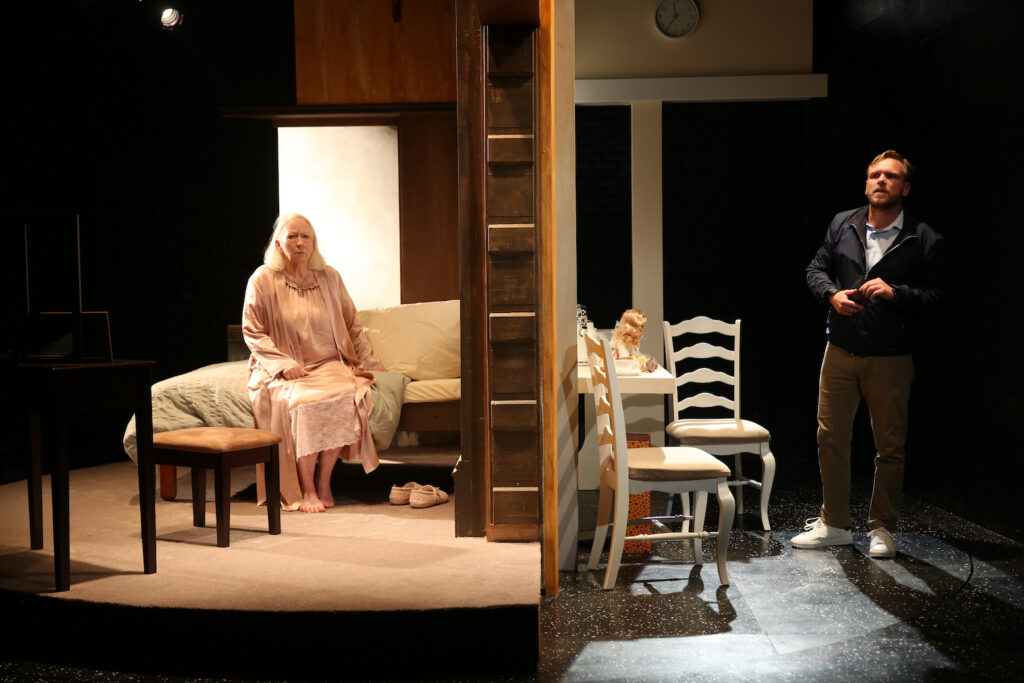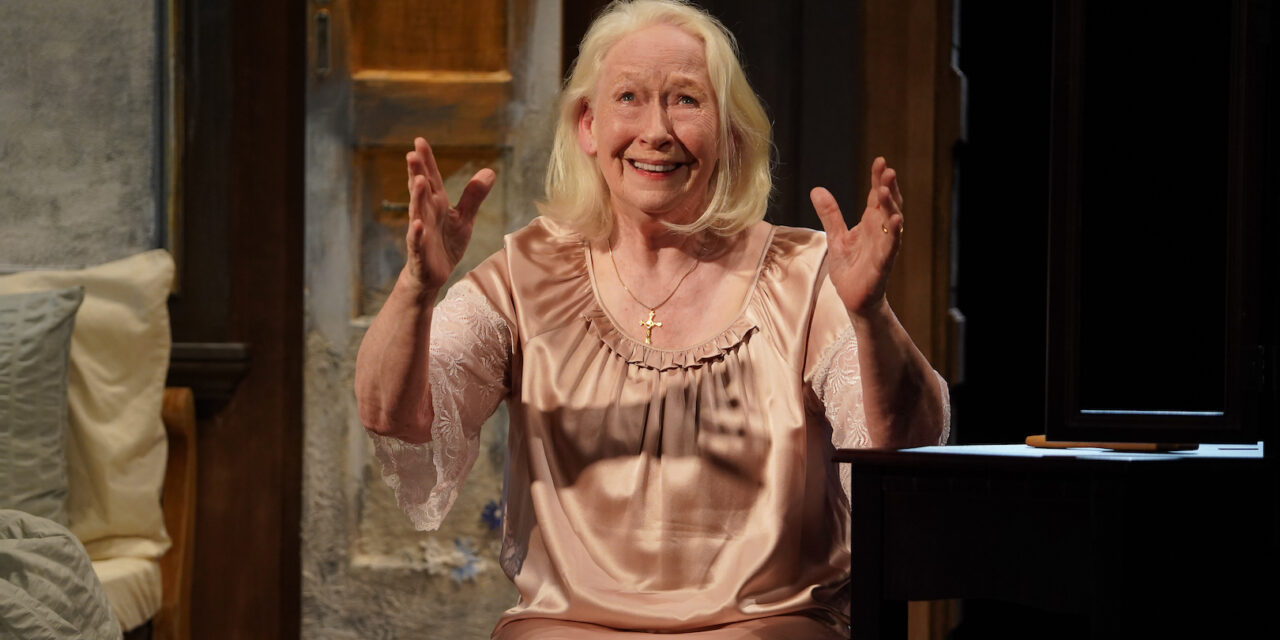By Samuel L. Leiter . . .
Deirdre Kinahan’s The Saviour, a one-act, two hander, running a shade over an hour, is now receiving its world stage premiere (following an online debut) at the Irish Rep in a superbly acted production, directed with precision by Louise Lowe. Set in 2020, the play, which could easily be viewed as two separate works, begins with a half-hour scene in which white-haired, 67-year-old widow, Máire Sullivan (Tony winner Marie Mullen, The Beauty Queen of Leenane), of Carlow, Ireland, sits in bed, speaking to Jesus. Her subject: the ecstasy she’s discovered late in life from the romantic and sexual pleasures provided by Martin, a younger, odd-jobs man she met at church.
In the second part, her gay son, Mel (Jamie O’Neill), arrives to disabuse his mother of her romantic illusions, revealing things he’s learned about Martin that should make her newfound hot blood turn to ice. The resistance he encounters—imagine an anti-Trumper trying to convince a defiant MAGA follower of their folly—ignites one of the more fiery debates currently being enacted on a New York stage.

While the second half, in which mother and son go at it hammer and tongs, is as bitingly realistic as anything by Clifford Odets, the first requires a suspension of disbelief made feasible principally by Mullen’s extraordinary performance as the incompletely hinged Máire. In her rambling monologue, Máire, enjoying the sinful delights of a cigarette after a toss in the hay, is talking about her intimacy with Martin to Jesus, who can only be described as her imaginary friend. Martin himself, she asserts, is downstairs making her coffee. Máire’s fantasy Saviour is a compassionate deity of love and forgiveness to whom she comfortably describes much of her most personal life, even making physical comparisons of Martin with Colm, her late husband of 42 years, and discussing their relative sexual behavior.
Her deep connection to Jesus is an outgrowth of her deeply traumatic youth, following her having been placed in the Stanhope Street convent by her widowed father when he no longer could care for her. This convent was one of those notorious ones known as Magdalene Laundries, reformatories where girls, many with troubled sexual pasts, were forced to do hard labor under brutally harsh conditions. (The subject has been dramatized for stage and film on multiple occasions, including Airswimming, seen at the Irish Rep a decade ago.) Filled with rich language and closely observed details of Máire’s life, some of it comic, the monologue is essentially a colorful expository narrative that establishes the psychological foundation for the susceptible Máire’s resistance to Mel’s news in the second half.


With its amusingly frank revelations of how an aging, fanatically pious woman—admittedly one verging on madness—guiltlessly reignites and revels in her long dormant sexuality, the monologue could easily be reconstituted as a stand-alone piece. Its premise, of her revealing everything to Jesus as if he didn’t already know what she’s been through, is not very convincing; but, Mullen’s brogue, charm, and emotional variations make it irresistibly compelling.
The play takes a sharp turn toward naturalism when Mel enters. After giving her—with unhappy results—a doll for a present, he gradually introduces what he’s discovered about Martin’s past. Speaking on behalf of himself and his two siblings (one of whom has two children), he reveals what his husband, Jack, uncovered. It’s probably best not to reveal the nature of Martin’s transgressions here, although a hint is buried in the previous sentence. Máire, though, is so thoroughly in her lover’s thrall she finds many reasons to reject Mel’s pleas. She insists, for example, that Martin is no longer what Mel claims he is, making a religiously-based argument on behalf of forgiveness. But, later, in a devastatingly explosive, homophobic moment, uses her son’s sexuality against his being a suitable messenger for the news he brings. Left alone at the end, her mind breaking as Mel’s disclosures blend with suppressed memories of recent events, Máire is ready to implode.


Mullen’s ability to wring multiple levels of emotionality (and humor) from this material is thoroughly impressive, as is O’Neill’s ability to go tit for tat in expressing his anger at and frustration with his mother, while never suggesting that he doesn’t, at the same time, love her.
Lowe’s staging incorporates a revolving set designed and lit by Ciaran Bagnall that moves, as needed, from Máire’s shabby bedroom (whose papered-over window above the bed incorporates narrow wooden sticks suggesting a horizontally extended cross) to a tiny kitchen dining area, and back again. Aiofe Kavanagh provides a substantial sound design, although I had difficulty making out some key verbal elements in the climactic effect that concludes the play.
As noted, Deirdre Kinahan provides in The Saviour what, essentially, amounts to two plays in one, closely related as they may be. Considering the opportunity it offers Marie Mullen to demonstrate her exceptional gifts, it’s guaranteed to make a trip to West 22nd Street well worth the effort. Cross my heart.
The Saviour. Through August 13 at Irish Repertory Theatre (132 West 22nd Street, between Sixth and Seventh Avenues). www.irishrep.org
Photos: Carol Rosegg


















